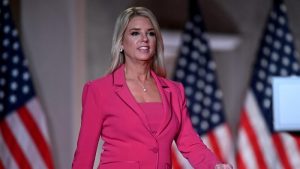How Trump learnt to love big business
Unlock the US Election Countdown newsletter for free
The stories that matter on money and politics in the race for the White House
When a billionaire campaigns for Donald Trump, we know what’s in it for the billionaire. What’s in it for Trump? Not votes from the watching electorate, that seems clear. Big business is the least trusted institution in America other than Congress. Donations, then? But those can be collected without the public fanfare of an Elon Musk stage appearance or an endorsement quote from a private equity nabob.
Whatever the explanation for it, this overt embrace of the ultra-rich wasn’t always Trump’s way. He once defined himself against Wall Street, Palo Alto and job-exporting, pro-immigrant industrialists. He opposed the Chamber of Commerce Republicanism of Mitt Romney as much as he ever took on the Democrats. “Amazon is getting away with murder tax-wise” reads like a Bernie Sanders line. It’s from Trump in 2016.
The largest difference between Trump now and Trump then is that he has given up the pretence of being a Citizen Kane-ish friend of the worker: a man who knows the self-dealing knavery of the 1 per cent from the inside, and aims to end it. In fact, of all the themes in his campaign-closing rally last weekend — Kamala Harris’s IQ, America’s ethnic stock, enemies “within” — few were economic.
Of course, tariffs are the great anomaly in his general concession to business interests. Away from trade, though, it is eerie how redolent Trump now is of the Republicans of yesteryear. Cutting corporation tax in 2017, when the rate was 35 per cent, was one thing. He now wants it down from 21 to 15 per cent for some companies. Throw in his antitrust approach, which should be less interventionist than Joe Biden’s, and this economic platform might be called Romney’s Revenge without too big a tongue in the cheek.
It is natural to read all this as an extraordinary feat of capture by private sector lobbyists. In fact, it reveals more about Trump himself. He has had two idées fixes throughout his entire career of public utterances: scepticism of immigration, and above all of international trade. All else is fluid. Once corporate America started to bend the knee to him — it began when Biden seemed certain to run again, and to lose — Trump’s qualms about stone-faced capitalism melted at speed. What matters to him is the coming to heel of the once-hostile. The arc of the Washington Post under Jeff Bezos, which once abhorred Trump and now declines to endorse either him or Harris, is exemplary.
At this point, I should, and dearly want to, issue the old liberal warning to business: that capitalism depends on independent courts and other institutions, that Trump menaces these, that billionaires are therefore shortsighted to back him. If you ride the tiger, you’ll end up as its dinner, and so on. But I don’t quite believe this any more. What the magnates stand to gain — tax cuts, deregulation, a standoffish Federal Trade Commission — is immediate. Trump-induced institutional rot is much slower to play out, and probably won’t go so far as to erode property rights. (Though it might include politicised central bank decisions.) Supporting him out of material interest might be ignoble, but it isn’t obviously irrational.
If anything, the most striking and admirable thing about America’s ultra-rich is how many still oppose Trump. Harris is handsomely out-raising him in campaign donations. Given the incentives facing them, theirs is an expensive show of honour. It is Musk and his ilk who are backing what game theorists would advise as the right candidate.
The mystery is what Trump and his wider movement get out of it. To judge by that final gathering in Madison Square Garden, their aim is a more traditional society. At the same time, their man proposes a freer market. It is hard to see how they can have both. This is the eternal conservative fork, or dilemma, and even Margaret Thatcher failed to resolve it. When a migrant moves country for higher pay, or a “woke” idea spreads via a new tech platform, or gender roles change because women earn their own incomes, or the lure of church on a Sunday can’t compete with a dozen other consumer entertainments, this is the market at work. At some point, a cultural conservative has to curb it or give up hope of conserving much.
When he broke through as a presidential contender, Trump seemed to intuit all this. There was something of the continental European populist about his message, which was wary of the market because wary of social flux. His subsequent embrace of his more Darwinian instincts is, besides the ageing process itself, the starkest change in the man who first won office in 2016.
After that shock, liberals tried to fathom what had happened — all those vox pops in Midwestern diners — and suggested something plausible. The modern economy had come to grossly over-reward cognitive power as against skilled manual labour, care work and the like. Trump spoke, however coarsely, for the short-changed. Even if this account of things glossed him a lot, it spoke a trace of truth. All the odder, then, that eight years on he has a recurring fixation with IQ and a pact with the Nietzschean end of Silicon Valley libertarianism. If it doesn’t stop him winning, it will stop him pleasing those at the Garden who count on getting an older America back.
#Trump #learnt #love #big #business





